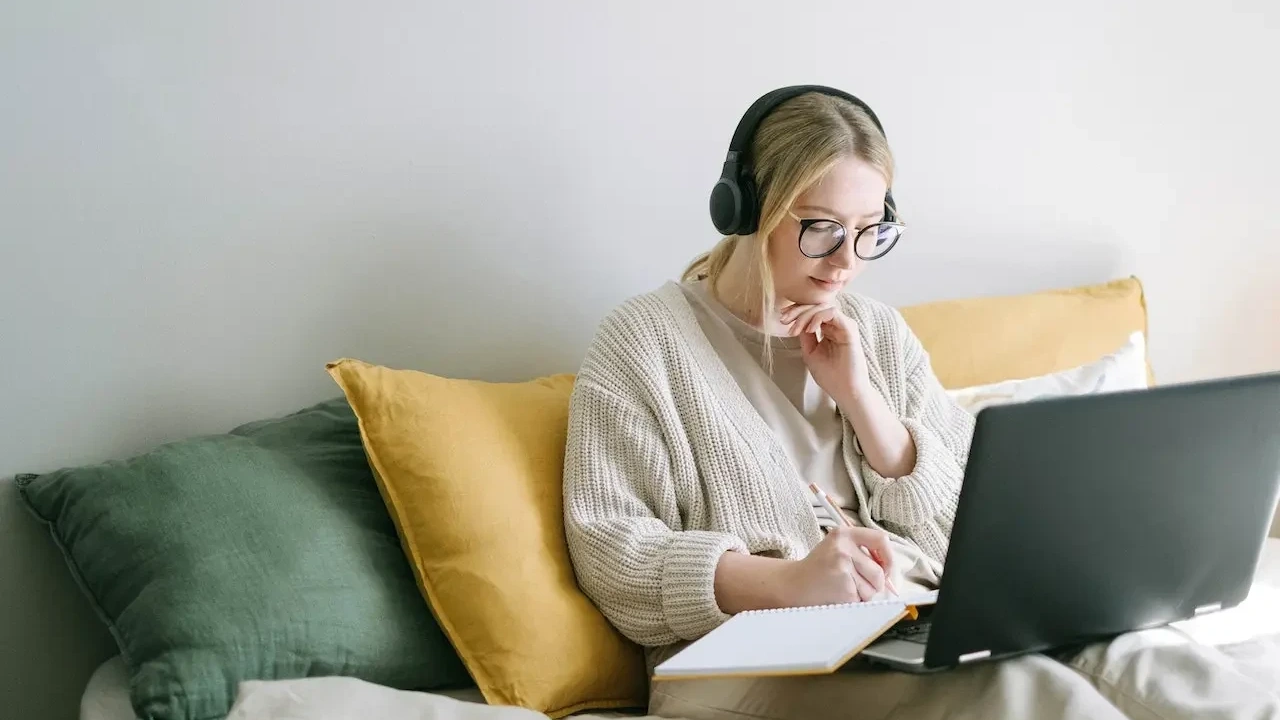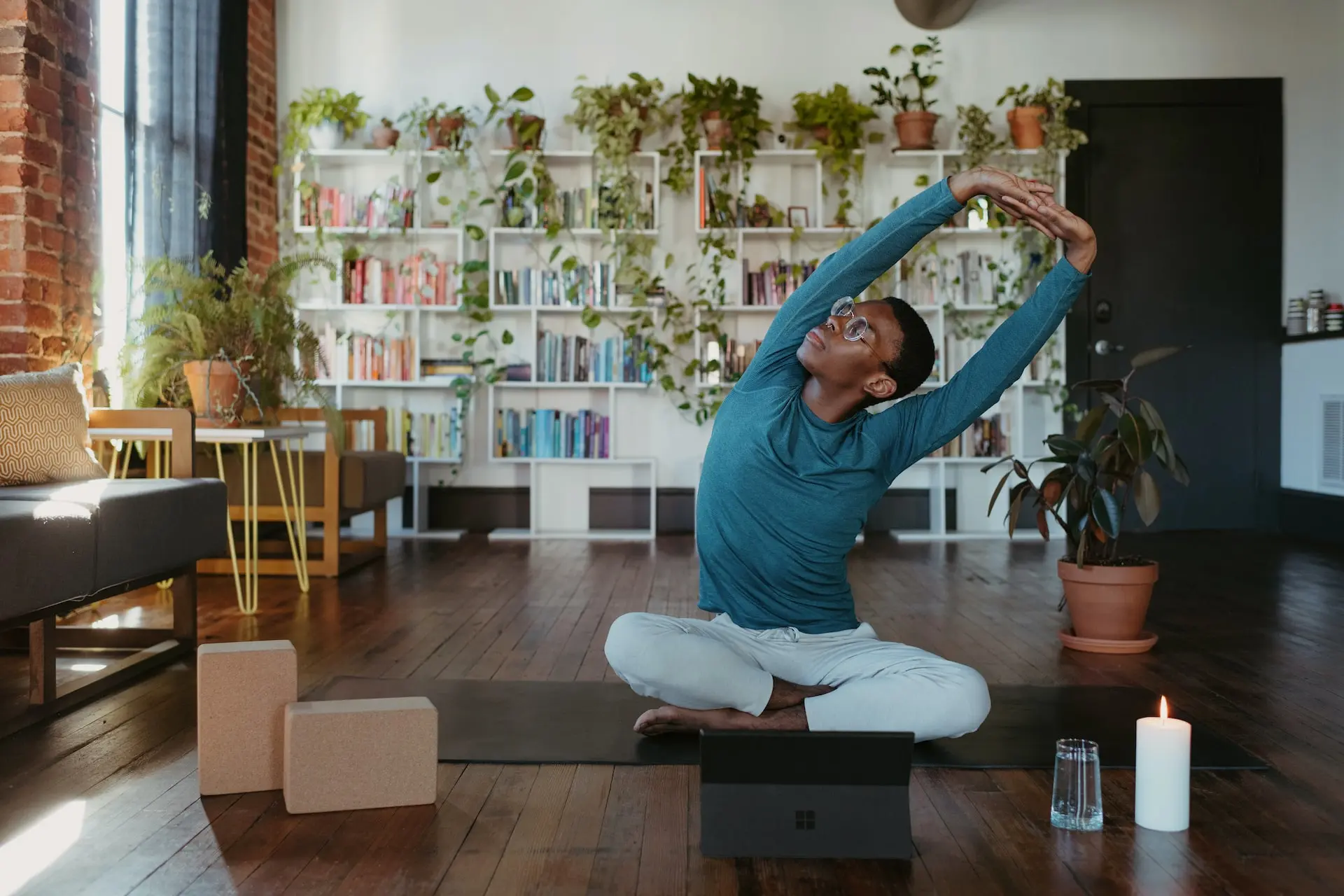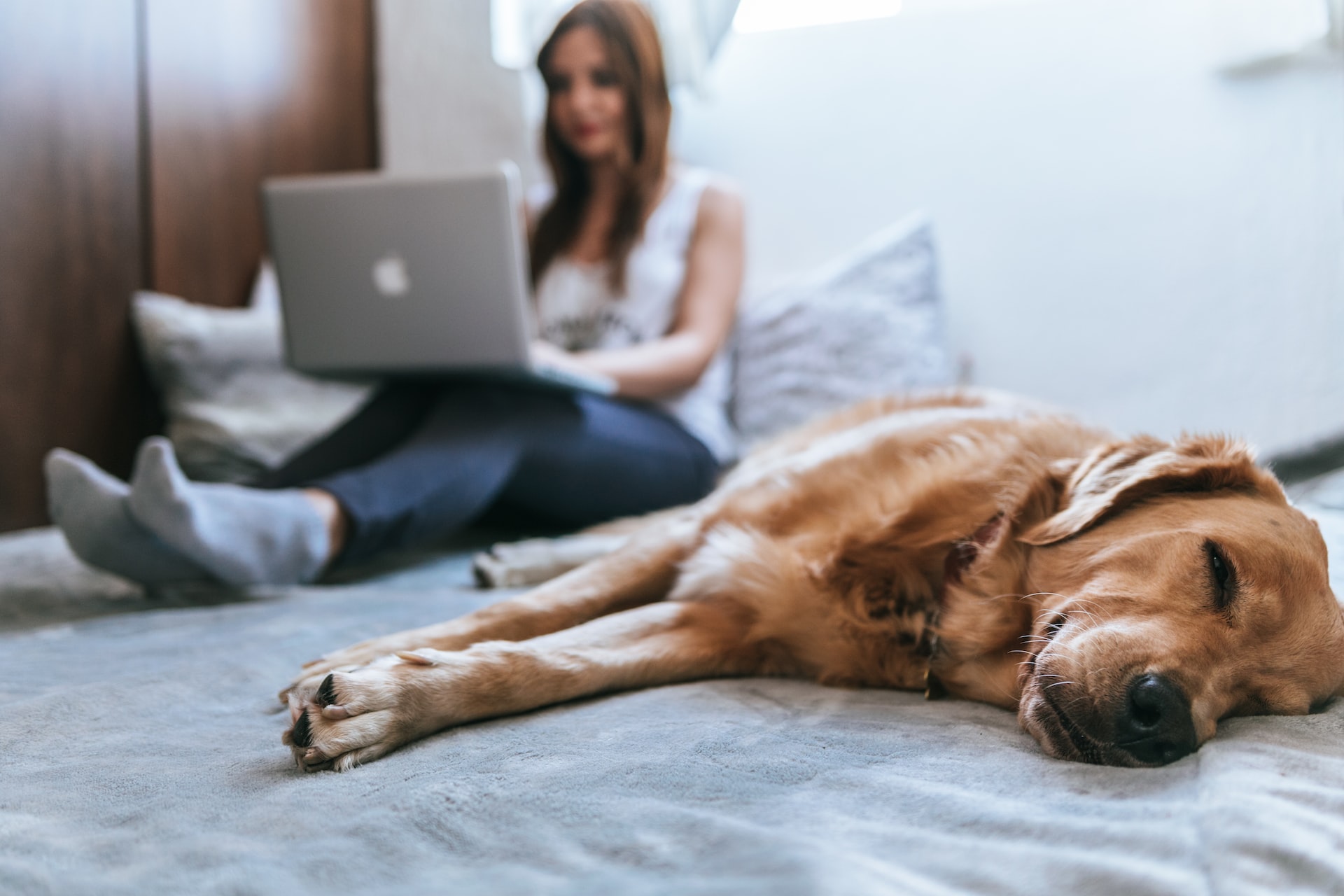How to Lose Weight if You Work from Home

As we near the end of the global COVID pandemic – we are nearing the end of it, right? – many things have returned to the way they were before, but remote work, or working from home, still continues to be a part of many people’s lives, and it looks like that change is here to stay.
Working from home presents some amazing opportunities for improving your health, but it can also present some unique challenges.
If you currently work from home and feel like you’ve got your health totally under control, umm, skip this! What are you doing here? But if you work from home and feel like you’re having difficulty with your eating habits, not moving your body as much as you’d like to, if you’re stressed out, feel like you just can’t manage your time, or you feel lonelier than you used to, then stick around, as I have some tips that could help you out. I’m also going to talk about some of the really common advice we always hear about working from home, and why I think it’s utter BS.
So, hi! This is Julie from Julie Saad Wellness, holistic weight loss coaching. I help people lose weight and reclaim their vitality through a transformational program that uses scientifically-backed nutrition information combined with an overall life upgrade.
Working from Home Remains Popular
At the moment, according to a study by a consulting group called McKinsey & Company, nearly six out of ten people have the ability to work from home at least one day a week, whereas another 35 percent work from home the entire week. This was based on a survey they did of 25,000 workers. Working from home brings with it both opportunities and its own unique set of challenges when it comes to our health.
On one hand, there are none of the traditional workplace distractions, no coworkers popping by your desk to chat for example, so you may find that you can get more done when working from home. When it comes to food, you may have more control over your food choices, as your kitchen is just steps away from your workspace. Less time spent commuting can add more time back to your day, and you may have more flexibility in your schedule as well, both of which can lead to reduced stress levels.
On the other hand, working from home can also have its drawbacks. Exercise is not built into the day, whereas when going to the office at the very least you have to walk to your car. Social interaction is also not really built into your day the way it is when you’re at the workplace. Some people also struggle with not having a clear start and end to the workday, which can make it more difficult to relax. Increased screen time and screen time that’s pushed later into the day can disrupt your sleep, while less exposure to sunlight can also take its toll. Last but certainly not least, when you’re working from home, it can be easier to not really structure and plan your workday, which can create a whole host of problems.
So let’s look at these issues in more detail and talk about ways to optimize your health when your home is also your workplace.
Exercise
First up exercise. You would think that with the extra time that not having to commute saves us, those of us that work from home would be getting in much more physical activity, however, that doesn’t appear to be the case
.
I believe that one reason for this is that when working from home, the day can seem infinite. If you don’t work out in the morning, surely you’ll do it in the afternoon, right? If you have some flexibility in your schedule, it’s tempting to think you’ll just squeeze in some exercise somewhere during the day. In my opinion, it’s important to really set aside a time to get in some physical activity if that is part of your health upgrade plan. Actually put it on your calendar, and do everything you can to make it as easy as possible to get going. You can try my “coffee walk” idea if you like walking in the mornings and you like coffee, I’ll put a link in the description below.
Another suggestion I have is to create a bare minimum for yourself for exercise. This can be particularly helpful if you’ve completely stopped exercising. Your bare minimum can be a ten-minute walk every day, or a five-minute dance party, for example. I did this several years back when I realized I was getting sucked into the computer and that days were going by without me really moving very much. I bought myself a calendar and a pack of cute stickers, and in order to get a sticker, I had to go outside and walk for at least twenty minutes. On some days I incorporated more physical activity into my day, but at the very least I managed to get a bit of movement in there. The reason I like the idea of a bare minimum is that you can make it something doable. Choose something that you’ll know you’ll always have time and energy for, and then if you want to get more exercise on any given day, you can. I think it’s easy to write off the day completely if we have a big elaborate exercise plan that we don’t get around to doing, but by thinking of your exercise plan as more of a range, with a bare minimum at the lower end, it’s easier to avoid the all-or-nothing trap.
Social Interaction
Including social interaction into your life can help to reduce stress and strengthen your immune system. For many of us, our social lives can be very much tied to work. When we’re suddenly not at the office any more, it can be a bit of a shift to find ways to socialize. Take stock of your current social life. Do you feel as though you spend enough time seeing others? If not, now’s the time to brainstorm some ideas for how to get more social interaction into your life. It could be as simple as making a point to regularly invite friends to get together, and making a routine of it, so, for example every Tuesday at 12pm you’ll message at least one person to see if they want to get together this week. You may also want to join a class or a local club to have a regular place and time to talk to people. The point is, you may need to be more intentional than you were when you were at the office and get-togethers seemed to spontaneously appear. Set time aside in your calendar for meeting up with folks.
Food
Food, glorious food! As I mentioned before, working from home gives you the chance to really take control of your nutrition. You can cook all of your own food if you want to, without worrying about having to pack a lunch for work the next day. However, it does take a bit of strategy. Just as it’s easy to not really plan when you’re going to exercise and then just, well, not do it, it can also be easy to be somewhat lax with your food choices for the week since the kitchen’s right there and you can cook whenever you want. I’d encourage you to create a routine around your meal prep, whether that’s cooking food in large batches at the start of the week, or at least putting together a general idea of what you’re going to eat on each day so that you know you have everything you need and can easily prepare something when you want. It’s also a great idea to have some simple ready-to-eat or easy to prepare food on hand, just in case you get stuck doing something at work and have to grab something quickly. My go-tos are avocados, hard-boiled eggs, cold cuts, and nuts. I can always pull something together with these items. If you enjoy going to restaurants or ordering takeout, prepare yourself by looking at menus before you’re really hungry and in a rush. That way you can make good decisions.

The Endless Workday
For many people this is the main issue when working from home. The day just isn’t as structured as it is when it’s book-ended by a commute to and from the office. The danger in this is that the workday can expand to fill all of your available hours and you can exist in this strange state where you’re just kind of working all day and not really relaxing. It can also affect all of the other areas I mentioned before, as having somewhat of a vague schedule can make it more difficult to exercise, get out and see people, and focus on healthy eating. So I would argue that it’s a good idea to create a solid work schedule for yourself when working from home. Think about what time you would like your workday to start and end, and plan accordingly. It’s important to get clear about how much time you have and how much you can realistically do in this time. This is where thinking about your day strategically can make a world of difference.
Now, you’ll hear all sorts of advice on how to set up your workday for success, but ultimately it’s whatever works best for you. For example, some people say you should never work in your pajamas, the idea behind this being that your brain will still be in sleep mode. I say that if you’re comfortable and you are able to work in your pajamas and you want to, then why not? It can be a great tool if you’re the type that likes to wake up and get right to work. Yet if your intention is to do something else in the morning before you start the workday, then you need to take steps to make sure that happens. I personally have a morning routine now that involves making coffee and going outside for a walk. I know myself well enough to know that if I even open my email, goodbye walk. So I have all notifications disabled except for phone calls in case there’s a true family emergency, and don’t allow myself to look at anything except for whatever app I’m going to use to listen to something on my walk.
Another piece of work-from-home advice that we always hear that I also think is BS is - Don’t do chores during your workday! Again, I ask, “Why not?” One of the theories behind this is that it can distract you, and yes, if you suddenly decide to alphabetize your bookshelf for four hours, you might find that you haven’t gotten much work done, but if you used to work in an office, think back to your typical work day. Did you work non-stop, never doing a single non-work related thing for even a minute? If you did, I think you are a rarity. I think telling ourselves that we can’t do “non-work stuff” doing work hours isn’t realistic. In a typical office, we spend 2.9 hours per day doing non-work related stuff.
Now, however you want to look at it, whether it’s that people can’t focus for hours on end without stopping or that the work day is just too long, the point is that even in an office there is a lot of downtime. If you work from home and you tell yourself, “I’m going to put in eight hours of solid work, from 9-6 with an hour for lunch,” and that’s something you’re perfectly capable of doing, great! In my personal opinion, it’s much more realistic to admit to ourselves that we do need distractions and breaks throughout the day. If we’re intentional with them, they can work quite well within our schedules. I would also argue that if your work involves working in front of a screen all day, then sorting out the recycling, throwing some clothes in the washer, or tidying up a small area of the house can be a much better break for your eyes than scrolling through social media or news websites, and can also free up more of your time later in the day.
Just put it on your calendar so that you’re intentional with it and it doesn’t throw you off.

Sunlight, Screens, and Sleep
No conversation about working from home would be complete without mentioning sunlight, screens, and sleep. Now I’m sure you know that regular exposure to sunlight has many benefits, from allowing your body to create its own vitamin D to helping you sleep better. Unfortunately, when working from home, it’s very easy not to leave the house at all. Be careful of falling into this pattern, and do what you can to get some sunlight exposure every day, whether that’s going outside, sitting on your balcony, or worst-case scenario just opening a window and sticking your head out. Conversely, I’m sure you’ve also heard by now that blue light from screens can negatively impact your sleep if you’re exposed to it too close to bedtime. Because of this, avoiding workday creep is all the more important. By allowing yourself to work late into the night, you can really diminish the quality of your sleep by staring at blue light after the sun’s already set. If you must do this, put your devices on night mode so that the screens are a warmer color temperature.
Comfort
I want to mention another piece of advice that I frequently hear thrown around when talking about working from home. You very often hear people say that you must have a dedicated work space and only do your work there or else! Or else what? Somehow this idea has emerged that we must be seated at our desks or otherwise our brains will stop working. I believed this for a long time, and it actually made it difficult for me to be productive. I don’t really like sitting at a desk to work. It’s really uncomfortable for me. I do much better if I can recline a bit and put my feet up. If this is true for you as well, don’t buy into the myth that you always have to do your work in the same place. In fact, it’s better for your body to have some variation throughout the day in terms of what position it’s in, whether that’s a combination of standing and sitting, sitting or lying down, whatever. And that brings me to another point.
You will often hear, “Never work from your bed!” People tend to be emphatic about this advice, claiming it will ruin your sleep hygiene. First of all, I spent quite a bit of time trying to find actual research about the benefits of sleep hygiene. I found lots of studies with inconclusive results, and couldn’t find any studies that showed a significant benefit. If anyone has any good data on this, please share it with me. Now, I’m not saying that you shouldn’t take steps to minimize noise and light while you’re actually sleeping, but this idea that if you do anything except sleep in your bed you will automatically have insomnia is something that I haven’t seen evidence of, yet we all seem to believe it is true because it makes sense, theoretically.
Working from your bed can help you relax, may increase your creativity, can help alleviate back pain, and can be a useful tool if you have trouble getting started in the mornings. You can have too much of a good thing, though, as more than five hours a day working from your bed can begin to have the opposite effect and cause back issues.
I was a firm believer in this, “never work from bed” dogma for a long time, even though I’ve always been a big “work from the sofa” kind of gal. The other day, though, circumstances dictated that I work on a project from, you guessed it, my bed. I was shocked at how productive – and comfortable – I was!
Conclusion
In summary, when working from home, we want to set ourselves up for success, not just professionally, but from a health standpoint as well.
In order to do this, be intentional about your schedule. Make sure that you have time set aside for the things that will help you improve your health, whether that’s exercise, strategic food preparation, getting together with friends, relaxing, getting some sunlight, sleeping like a boss, being physically comfortable, or all of the above.
Thanks so much for reading, and have a happy and healthy day.

